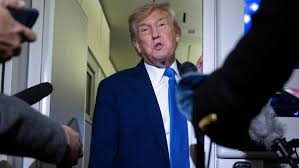In a rapidly escalating geopolitical crisis, President Donald Trump is reportedly considering a U.S. military strike on Iran’s nuclear facilities, a move that could dramatically reshape the Middle East and global security dynamics.
The deliberations come in the wake of intensifying hostilities between Israel and Iran, with missile exchanges and airstrikes pushing the region to the brink of a broader war.
A Calculated Gamble
According to multiple sources close to the administration, Trump has approved detailed military plans targeting Iran’s fortified nuclear sites, including the Fordow uranium enrichment facility, which lies deep beneath a mountain.
However, he has not yet issued a final order to proceed.
The president is said to be weighing the potential fallout of such a strike, both militarily and politically, as he gauges Iran’s response and the reaction of key allies and domestic stakeholders.
Trump’s rhetoric has grown increasingly aggressive. In recent public statements, he has demanded Iran’s “unconditional surrender” and warned that the U.S. has “complete and total control of the skies over Iran.”
He has also made veiled threats toward Iran’s Supreme Leader, Ayatollah Ali Khamenei, calling him an “easy target” while stopping short of authorizing an assassination.
The Fordow Dilemma
At the heart of the military debate is the Fordow facility, a heavily fortified site believed to be central to Iran’s nuclear ambitions. Intelligence assessments suggest that conventional weapons, including the U.S. military’s most powerful bunker-buster bombs, may not be sufficient to destroy the site entirely.
Some Pentagon officials have reportedly floated the possibility of using a tactical nuclear weapon—an option fraught with global consequences.
Trump has expressed skepticism about the effectiveness of conventional strikes and is said to be consulting with military advisors, intelligence officials, and political allies as he considers his next move.
The administration’s goal appears to be to cripple Iran’s nuclear capabilities without triggering a full-scale war.
Domestic and International Reactions
The prospect of U.S. involvement in another Middle Eastern conflict has sparked intense debate in Washington.
Congress is divided, with some lawmakers demanding a formal vote before any military action is taken, citing constitutional war powers. Others argue that a limited strike does not require congressional approval.
Public opinion is similarly split. While polls show that many Americans view Iran as a significant threat, there is also widespread fatigue with foreign interventions.
Trump’s base, known for its nationalist and isolationist leanings, is not uniformly supportive of military escalation.
Internationally, the situation is equally complex. European leaders are urging restraint and pushing for renewed diplomatic efforts.
Meanwhile, Iran has vowed to retaliate if attacked, raising fears of a broader regional conflict that could draw in other powers and destabilize global energy markets.
A Defining Decision
As the world watches, Trump faces one of the most consequential decisions of his presidency. A strike on Iran could achieve a strategic objective—delaying or dismantling its nuclear program—but at the risk of igniting a wider war.
Conversely, restraint could be seen as weakness, emboldening Iran and undermining U.S. credibility.
The coming days are critical. Whether Trump chooses diplomacy or force, the outcome will reverberate far beyond the Middle East, shaping the global order for years to come.














.jpg)
.jpg)




0 Comments